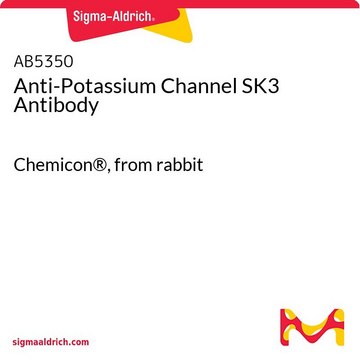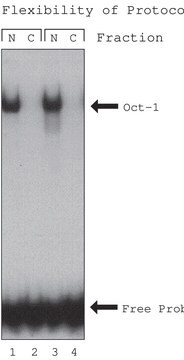P0608
Anti-Potassium Channel SK3 (KCa3, Kcnn3, SKCa3) antibody produced in rabbit
affinity isolated antibody, lyophilized powder
Sinonimo/i:
Anti-KCa2.3, Anti-SK3, Anti-SKCA3, Anti-ZLS3, Anti-hSK3
Autenticatiper visualizzare i prezzi riservati alla tua organizzazione & contrattuali
About This Item
Prodotti consigliati
Origine biologica
rabbit
Livello qualitativo
Coniugato
unconjugated
Forma dell’anticorpo
affinity isolated antibody
Tipo di anticorpo
primary antibodies
Clone
polyclonal
Stato
lyophilized powder
Reattività contro le specie
rat, human
tecniche
western blot (chemiluminescent): 1:200 using rat brain membranes
N° accesso UniProt
Temperatura di conservazione
−20°C
modifica post-traduzionali bersaglio
unmodified
Informazioni sul gene
human ... KCNN3(3782)
rat ... Kcnn3(54263)
Descrizione generale
The calcium-activated potassium ion channel (KCNN3) is a voltage-independent small-conductance calcium-activated potassium channel. It is abundantly expressed in the brain and central nervous system. Its predominant expression is seen in the hypothalamus. KCNN3 gene is located on human chromosome 1q21.3.
Immunogeno
synthetic peptide corresponding to amino acids 2-21 of human potassium channel SK3. The epitope is highly homologous in rat.
Applicazioni
Anti-Potassium Channel SK3 (KCa3, KCNN3, SKCa3) antibody produced in rabbit has been used in western blot analysis (1:250) and immunohistochemical staining (1:50).
Azioni biochim/fisiol
Anti-Potassium channel SK3 recognizes the SK3 protein in humans and rats by immunoblotting. Potassium channels contribute to maintaining cell volume, membrane potential, neuronal excitability, and the secretion of transmitters, salt, and hormones. It is extremely sensitive to changes in intracellular calcium levels, which are common during action potentials. KCNN3 helps to determine neuronal firing rates via the after-hyperpolarization. It is a migraine candidate susceptibility gene. Aberrations in the KCNN3 gene may trigger cortical spreading depression (CSD) and trigeminal sensitivity.
Stato fisico
Lyophilized at ~0.6 mg/ml from phosphate buffered saline, pH 7.4, containing 1% bovine serum albumin, and 0.05% sodium azide.
Esclusione di responsabilità
Unless otherwise stated in our catalog or other company documentation accompanying the product(s), our products are intended for research use only and are not to be used for any other purpose, which includes but is not limited to, unauthorized commercial uses, in vitro diagnostic uses, ex vivo or in vivo therapeutic uses or any type of consumption or application to humans or animals.
Non trovi il prodotto giusto?
Prova il nostro Motore di ricerca dei prodotti.
Codice della classe di stoccaggio
11 - Combustible Solids
Classe di pericolosità dell'acqua (WGK)
WGK 2
Scegli una delle versioni più recenti:
Possiedi già questo prodotto?
I documenti relativi ai prodotti acquistati recentemente sono disponibili nell’Archivio dei documenti.
Association study of CAG repeats in the KCNN3 gene in Israeli patients with major psychosis.
Ritsner M
Psychiatric Genetics (2003)
Two conserved arginine residues from the SK3 potassium channel outer vestibule control selectivity of recognition by scorpion toxins.
Feng J
The Journal of Biological Chemistry (2013)
Association between SNP rs13376333 and rs1131820 in the KCNN3 gene and atrial fibrillation in the Chinese Han population.
Luo Z
Clinical Chemistry and Laboratory Medicine (2014)
SK3/TRPC1/Orai1 complex regulates SOCE-dependent colon cancer cell migration: a novel opportunity to modulate anti-EGFR mAb action by the alkyl-lipid Ohmline
Maxime G
Oncotarget (2016)
Pivotal role of the lipid Raft SK3-Orai1 complex in human cancer cell migration and bone metastases.
Aurélie Chantôme et al.
Cancer research, 73(15), 4852-4861 (2013-06-19)
The SK3 channel, a potassium channel, was recently shown to control cancer cell migration, a critical step in metastasis outgrowth. Here, we report that expression of the SK3 channel was markedly associated with bone metastasis. The SK3 channel was shown
Il team dei nostri ricercatori vanta grande esperienza in tutte le aree della ricerca quali Life Science, scienza dei materiali, sintesi chimica, cromatografia, discipline analitiche, ecc..
Contatta l'Assistenza Tecnica.








